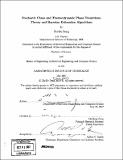Stochastic chaos and thermodynamic phase transitions : theory and Bayesian estimation algorithms
Author(s)
Deng, Zhi-De
DownloadFull printable version (31.51Mb)
Other Contributors
Massachusetts Institute of Technology. Dept. of Electrical Engineering and Computer Science.
Advisor
Chi-Sang Poon.
Terms of use
Metadata
Show full item recordAbstract
The chaotic behavior of dynamical systems underlies the foundations of statistical mechanics through ergodic theory. This putative connection is made more concrete in Part I of this thesis, where we show how to quantify certain chaotic properties of a system that are of relevance to statistical mechanics and kinetic theory. We consider the motion of a particle trapped in a double-well potential coupled to a noisy environment. By use of the classic Langevin and Fokker-Planck equations, we investigate Kramers' escape rate problem. We show that there is a deep analogy between kinetic rate theory and stochastic chaos, for which we propose a novel definition. In Part II, we develop techniques based on Volterra series modeling and Bayesian non-linear filtering to distinguish between dynamic noise and measurement noise. We quantify how much of the system's ergodic behavior can be attributed to intrinsic deterministic dynamical properties vis-a-vis inevitable extrinsic noise perturbations.
Description
Thesis (M. Eng. and S.B.)--Massachusetts Institute of Technology, Dept. of Electrical Engineering and Computer Science, 2007. Includes bibliographical references (p. 177-200).
Date issued
2007Department
Massachusetts Institute of Technology. Department of Electrical Engineering and Computer SciencePublisher
Massachusetts Institute of Technology
Keywords
Electrical Engineering and Computer Science.